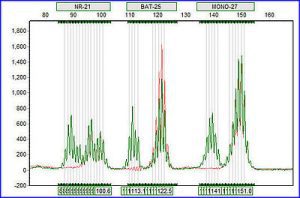Microsatellite instability, often abbreviated as MSI, is a genetic phenomenon that has become a critical focus in cancer research and diagnostics. Understanding microsatellite instability can help in identifying genetic mutations linked to certain cancers, making it a valuable marker in the field of oncology.

What is Microsatellite Instability
Microsatellite instability refers to changes that occur within microsatellites, which are short, repetitive sequences of DNA scattered throughout the genome. Normally, DNA replication processes are accurate, ensuring that these sequences remain unchanged. However, when the cellular mechanisms that repair DNA – specifically the mismatch repair (MMR) system – fail, errors begin to accumulate in microsatellites. This accumulation of errors leads to what we identify as microsatellite instability.
Microsatellite instability is commonly observed in specific types of cancers, including colorectal, gastric, and endometrial cancers. The presence of MSI suggests that the DNA mismatch repair system may be compromised, allowing errors to persist in the genetic code.
How Microsatellite Instability Occurs
The DNA mismatch repair system is responsible for detecting and correcting errors during DNA replication. When the system is intact, it effectively removes errors, maintaining the stability of microsatellite regions. However, if any of the MMR genes – such as MLH1, MSH2, MSH6, or PMS2 – are mutated or inactivated, the repair system becomes ineffective. This failure leads to microsatellite instability, as errors are no longer corrected, resulting in a gradual accumulation of mutations over time.
This accumulation of mutations within microsatellite regions can impact gene function, potentially leading to abnormal cellular behaviors that contribute to cancer development.
Why Microsatellite Instability Matters in Cancer Diagnosis
Microsatellite instability has significant implications for cancer diagnosis, as it acts as a biomarker indicating whether the MMR system is functioning correctly. Understanding MSI status can assist in:
- Cancer Detection: MSI testing is commonly used to detect Lynch syndrome, a hereditary cancer syndrome that increases the risk of developing colorectal and other types of cancers. In patients with MSI-high tumors, Lynch syndrome may be present, prompting further genetic screening.
- Predicting Treatment Response: MSI status can influence treatment options, particularly for immunotherapy. Cancers with high microsatellite instability, known as MSI-H, often respond more favorably to immune checkpoint inhibitors, a type of immunotherapy. Recognizing MSI status helps oncologists tailor treatment strategies more effectively.
- Prognostic Value: Studies suggest that patients with MSI-high tumors generally have a better prognosis than those with microsatellite-stable (MSS) tumors. This makes MSI testing valuable not only for initial diagnosis but also for predicting outcomes.
Types of Microsatellite Instability Tests
There are several approaches to testing for microsatellite instability, each with unique applications and advantages. Common methods include:
Polymerase Chain Reaction (PCR) Testing
PCR testing is one of the most widely used methods for identifying MSI. This process amplifies microsatellite regions to detect instability, comparing the microsatellite length between normal and tumor tissue. Differences in microsatellite length suggest MSI, providing a straightforward and effective way to determine MSI status.
Immunohistochemistry (IHC) Testing
IHC testing assesses the presence of MMR proteins in tissue samples. If one or more MMR proteins are absent, it suggests a defect in the mismatch repair system, indicating MSI. IHC testing is often used alongside PCR testing to confirm results and improve diagnostic accuracy.
Next-Generation Sequencing (NGS)
Next-generation sequencing (NGS) offers a more comprehensive analysis of microsatellite regions by sequencing entire segments of DNA. NGS can identify MSI and other mutations with greater precision, making it suitable for complex cases or when traditional methods are inconclusive. While NGS is more expensive, its accuracy and detail make it a valuable tool in cancer diagnostics.
Microsatellite Instability and Immunotherapy
MSI-high cancers tend to have high mutation rates, producing abnormal proteins that the immune system can recognize as threats. For this reason, immunotherapies targeting immune checkpoints, such as PD-1 or PD-L1 inhibitors, are often effective in treating MSI-high cancers. When MSI-high status is confirmed, patients may benefit from immunotherapy, which has been shown to improve outcomes in specific MSI-related cancers.
Microsatellite Instability and Lynch Syndrome
Microsatellite instability is closely associated with Lynch syndrome, an inherited condition that increases cancer risk. Individuals with Lynch syndrome have mutations in MMR genes, leading to MSI and a higher likelihood of developing cancers, especially colorectal and endometrial cancers, at an earlier age. Genetic counseling and regular screening are essential for individuals with Lynch syndrome, as early detection and intervention significantly improve prognosis.
Benefits of Microsatellite Instability Testing
Microsatellite instability testing offers numerous benefits that extend beyond diagnosis. It enables oncologists to make more informed decisions regarding treatment and provides insights into a patient’s genetic predisposition to cancer. The main benefits include:
- Personalized Treatment: MSI status allows for the customization of cancer treatments, especially when immunotherapy is a potential option.
- Improved Screening for Genetic Syndromes: Detecting MSI in cancers like colorectal and endometrial tumors can reveal the presence of Lynch syndrome, guiding further genetic testing for family members.
- Prognostic Insights: MSI status provides valuable prognostic information, helping physicians predict disease progression and tailor monitoring strategies.
Challenges in Microsatellite Instability Testing
Despite its benefits, MSI testing presents certain challenges. Variability in MSI testing methods can lead to inconsistencies, and not all cancers exhibit MSI. Additionally, interpreting MSI results requires a thorough understanding of tumor biology, as some tumors may show low levels of instability without the clinical implications typically associated with MSI-high tumors.
The Future of Microsatellite Instability Research
Advancements in genetic testing and molecular diagnostics continue to enhance our understanding of microsatellite instability and its role in cancer. Future research aims to refine MSI testing methods, making them more accessible and reliable. As our knowledge of MSI expands, it will likely become an even more integral part of cancer diagnosis and treatment, ultimately improving outcomes for patients worldwide.
Microsatellite instability serves as a powerful tool in the fight against cancer, providing insight into genetic mutations, guiding treatment choices, and improving prognosis. With ongoing research and improvements in diagnostic techniques, MSI testing will continue to play a vital role in precision medicine.
